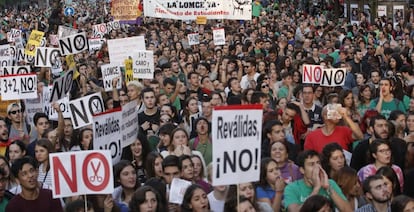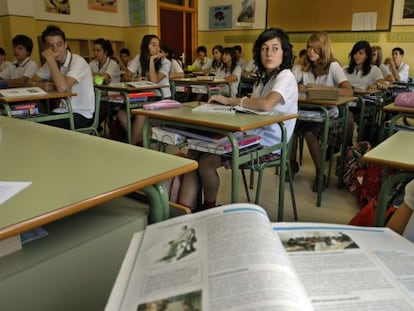Rajoy backtracks on Spain¡¯s controversial new school-leaver exams
Decision comes after mass protests against a system many fear will punish poorer students


Spain¡¯s acting Prime Minister Mariano Rajoy announced on Thursday that the government would delay the full roll-out of a new exam system that forms part of a package of controversial education reforms introduced by his conservative Popular Party (PP) in 2013.
Under the proposed changes students would be have to sit two externally assessed exams known in Spanish as r¨¦validas, or final examinations.
Critics say the new system will force students with economic and educational problems out of the classroom
The first of these exams would be taken at the end of the basic secondary education system (ESO), when students are aged 15 or 16, while the second such exam would take place when students complete their higher secondary education course (bachillerato) at the age of 17 or 18).
Students undertaking the first round of exams at 15 or 16 would have to pass to receive their high school diploma and be allowed to continue their studies. For the older group of students, the new exams would replace Spain¡¯s?selectividad university entrance tests.
The government has defended the new exams saying they will have a ¡°very positive¡± effect by giving students and their families a clearer idea of their progress.
But opponents want the system to be scrapped. They say it places too much emphasis on the results of individual exams ¨C 40% in the case of ESO exam and 30% for the bachillerato exam.
Critically, they also argue the system will force students with economic and educational problems out of the classroom, creating a system of haves and have-nots. Spain has the highest school dropout rate in Europe with 20% of students not having any form of high school diploma, according to European Union statistics.
The new system ¨C which is expected to cost the government €2.3 billion ¨C is being trialed during the current academic year but was expected to become standard in 2018.
The exams will now remain toothless until a cross-party education pact is drawn up
But speaking in parliament on Thursday, Rajoy said the exams would have ¡°academic effect until there is a national pact on education, as per my proposal of yesterday [Wednesday].¡±
During a tense investiture debate on Wednesday, the prelude to a second debate on Saturday at which Rajoy is expected to be named as the head of a minority government, the acting prime minister made mention of eight major issues that he is ready to discuss with the Socialists and the emerging reform party Ciudadanos. These topics include jobs, education, pensions and the fight against corruption.
This means that while the new exams will take place, they will essentially be toothless: for now, students aged 15 and 16 will not have to pass the exam to receive their school leaving certificate and the older students will continue to sit the current university entrance tests.
Rajoy¡¯s announcement comes a day after hundreds of thousands of students, teachers and parents protested against the proposed changes in more than 40 cities.
Between 30 and 40% of all students aged 14 and over this took part in the action while 12% of teachers stayed away from the classroom, according to official Education Ministry figures.
But unions behind the action put the figures as high as 90% for students and 60% for teachers, describing the day as an ¡°amazing success.¡±
Spain has the highest school dropout rate in Europe with 20% of students not having a high school diploma
Wednesday¡¯s strike was the latest in a series of 23 protests against the 2013 education law, the LOMCE, which the PP forced through Congress in 2013 despite the opposition of 11 political parties who saw it as ideologically driven.
¡°If they don¡¯t call off the exams by Monday, the Students¡¯ Union will take action again,¡± said group spokesperson Ana Garc¨ªa.
Meanwhile, the president of the Spanish federation of parent-teacher associations, CEAPA, demanded that the new minority government of Mariano Rajoy call off the exams within four months and start new parliamentary negotiations on the country¡¯s education law.
The organization also called on the government to reverse the cuts applied to the education sector during the crisis.
English version by George Mills.
Tu suscripci¨®n se est¨¢ usando en otro dispositivo
?Quieres a?adir otro usuario a tu suscripci¨®n?
Si contin¨²as leyendo en este dispositivo, no se podr¨¢ leer en el otro.
FlechaTu suscripci¨®n se est¨¢ usando en otro dispositivo y solo puedes acceder a EL PA?S desde un dispositivo a la vez.
Si quieres compartir tu cuenta, cambia tu suscripci¨®n a la modalidad Premium, as¨ª podr¨¢s a?adir otro usuario. Cada uno acceder¨¢ con su propia cuenta de email, lo que os permitir¨¢ personalizar vuestra experiencia en EL PA?S.
?Tienes una suscripci¨®n de empresa? Accede aqu¨ª para contratar m¨¢s cuentas.
En el caso de no saber qui¨¦n est¨¢ usando tu cuenta, te recomendamos cambiar tu contrase?a aqu¨ª.
Si decides continuar compartiendo tu cuenta, este mensaje se mostrar¨¢ en tu dispositivo y en el de la otra persona que est¨¢ usando tu cuenta de forma indefinida, afectando a tu experiencia de lectura. Puedes consultar aqu¨ª los t¨¦rminos y condiciones de la suscripci¨®n digital.










































